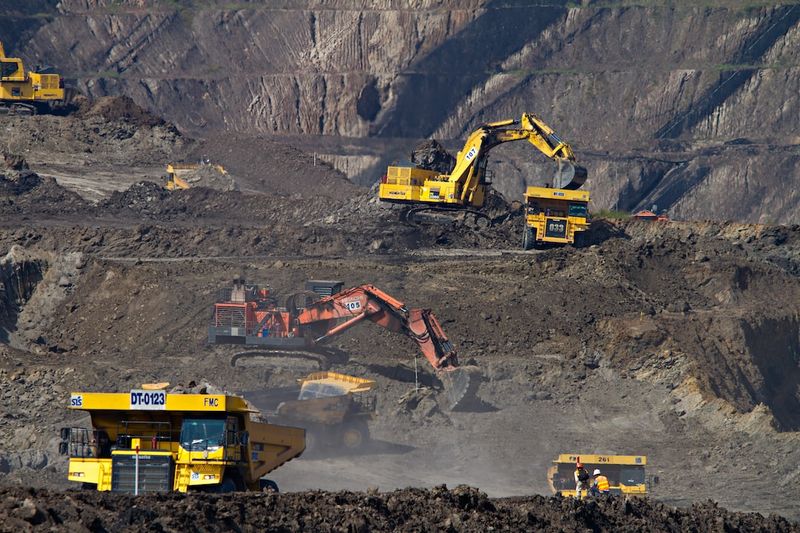Whitehaven Coal Secures Winning Bid for BHP Coal Mines with Support from Bank of America and Jefferies
Sarah Thompson, Kanika Sood, and Emma Rapaport
October 18, 2023 – 6.32pm
Wall Street banks Jefferies and Bank of America have emerged as the lenders behind Whitehaven Coal’s successful bid for BHP’s Queensland coal mines, Blackwater and Daunia. The bid, worth $US3.2 billion, saw Whitehaven defeat rival bidders BUMA and Stanmore Resources. The two banks provided the necessary funds through a $US900 million ($1.4 billion) bridge debt facility, which is expected to be replaced with longer-term debt financing in the future. This transaction not only secures Whitehaven Coal’s acquisition of the mines but also positions the two banks favorably for future investment banking opportunities with the company.
The auction, overseen by sell-side adviser Macquarie Capital, attracted bids from several other parties, including Peabody Energy, Yancoal Australia, and Coronado Global Resources. The minority owner of the mines, Mitsubishi, was advised by Rothschild & Co. While Whitehaven faced opposition from shareholder Bell Rock Capital, it opted not to raise equity for the acquisition. Instead, the company will finance the purchase through the debt facility, available cash, and cashflows from its expanded business over the next three financial years.
Whitehaven Coal has been designated as the “preferred bidder,” and the deal is anticipated to be finalized by June 30. The company has indicated that it is exploring options to sell a portion of the mines to global steel producers. The auction participants had previously sought to attract steelmakers JFE and Nippon Steel, as well as trading houses Marubeni and Sojitz. It is noteworthy that Whitehaven was initially working with Itotchu during the auction but had not yet finalized the partnership at the time of the announcement.
With the successful conclusion of this auction, financiers and investors are likely to shift their attention to other significant coal mines expected to come up for sale, particularly South32’s Illawarra and Eagles Downs.
Editorial Analysis
Whitehaven Coal’s triumph in acquiring BHP’s Queensland coal mines is a significant development in the coal mining industry. This purchase not only expands Whitehaven‘s presence but also brings attention to the role of investment banks, such as Jefferies and Bank of America, in supporting such transactions. The involvement of these Wall Street banks demonstrates their confidence in the future prospects of the coal industry, despite growing concerns about climate change and the transition to cleaner energy sources.
It is essential to recognize the ongoing debate surrounding coal mining and its environmental impact. While coal remains a crucial energy source in many countries, including Australia, its contributions to carbon emissions and climate change cannot be ignored. The acquisition of these mines by Whitehaven Coal raises questions about the long-term viability of the coal industry and the balance between economic growth and environmental sustainability.
The Risks and Opportunities of the Coal Industry
The Whitehaven-BHP deal highlights the risks and opportunities associated with the coal sector. On one hand, the acquisition represents a significant financial investment by Whitehaven, which sees potential value and profitability in Queensland’s coal reserves. This acquisition aligns with Whitehaven‘s strategy to capitalize on opportunities in the coal market, particularly in coking coal used in steel production.
On the other hand, the acquisition carries inherent risks due to several factors. Firstly, the ongoing global transition towards renewable energy sources poses long-term challenges for the coal industry. As countries prioritize reducing carbon emissions and combating climate change, demand for coal is expected to decline. This shift may impact the profitability of coal mining projects in the future.
Additionally, stricter environmental regulations and increased scrutiny from investors and stakeholders may pose challenges for Whitehaven Coal. The company will need to navigate these complexities, ensuring compliance with environmental standards and incorporating sustainable practices into their operations.
The Role of Investment Banks
The involvement of investment banks, such as Jefferies and Bank of America, in financing Whitehaven‘s bid emphasizes the crucial role these institutions play in facilitating large-scale transactions. As financial intermediaries, they provide access to capital, manage risks, and advise companies on strategic decisions. Their participation in this deal indicates confidence in the profitability and potential returns associated with the coal industry, despite the broader global shift towards renewable energy.
However, it is worth noting that investment banks also face increasing pressure to align their financing practices with environmental, social, and governance (ESG) considerations. Many major financial institutions have committed to sustainability and carbon neutrality goals, which raises questions about their support for industries associated with high carbon emissions. As the global focus on sustainability intensifies, investment banks will need to carefully balance economic interests with ESG considerations.
Advice for Whitehaven Coal and the Coal Industry
In light of this acquisition, it is crucial for Whitehaven Coal to proactively address environmental concerns and incorporate sustainable practices into its operations. This will help build credibility, enhance stakeholder trust, and ensure long-term viability in an evolving energy landscape. Embracing technological advancements, such as carbon capture and storage, can be an opportunity for the coal industry to reduce its environmental footprint and demonstrate its commitment to sustainable practices.
Furthermore, Whitehaven Coal should actively engage with stakeholders, including local communities, environmental organizations, and investors, to foster constructive dialogue and address concerns. Transparency, accountability, and effective communication will be essential in navigating the complex and often contentious relationship between coal mining and the environment.
For the wider coal industry, this acquisition serves as a reminder of the need to adapt and diversify in response to changing market dynamics. Investing in research and development of cleaner technologies and exploring opportunities in sustainable energy sources can help coal companies transition towards a more sustainable future.
Ultimately, the future of the coal industry depends on striking a balance between economic development, environmental responsibility, and social well-being. Companies like Whitehaven Coal, supported by investment banks, have an opportunity to lead the industry in addressing these challenges and shaping a sustainable future for coal mining in Australia and beyond.

<< photo by Dominik Vanyi >>
The image is for illustrative purposes only and does not depict the actual situation.




